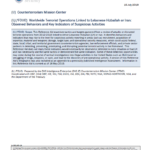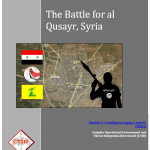
This Reference Aid examines tactics and targets garnered from a review of attacks or disrupted terrorist operations from 2012-2018 linked to either Lebanese Hizballah (LH) or Iran. It identifies behaviors and indicators that may rise to the level for suspicious activity reporting in areas such as recruitment, acquisition of expertise, materiel and weapons storage, target type, and operational security measures, which could assist federal, state, local, tribal, and territorial government counterterrorism agencies, law enforcement officials, and private sector partners in detecting, preventing, preempting, and disrupting potential terrorist activity in the Homeland. This Reference Aid does not imply these indicators would necessarily be observed or detected in every situation or that LH and Iran necessarily use the same tactics or demonstrate the same indicators. Some of these detection opportunities may come during the course of normal investigations into illegal activities in the United States such as illicit travel or smuggling of drugs, weapons, or cash, and lead to the discovery of pre-operational activity.

